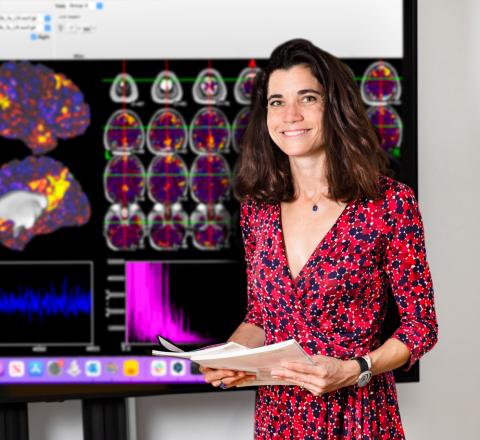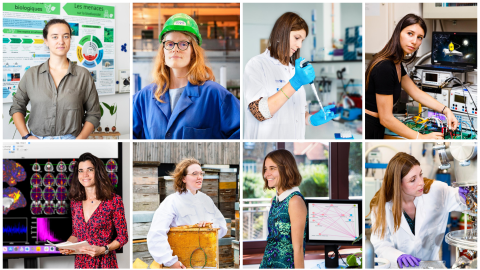
8 young women researchers from Université Paris-Saclay win the 2023 French Young Talents award
The winners of the 17th edition of the L’Oréal-UNESCO Foundation French Young Talents awards for Women and Science have just been announced. 35 talented young women researchers were selected from among 618 applications of 59 different nationalities and 94 doctoral schools. Université Paris-Saclay is proud of its eight laureates in 2023.
They jury was composed of 32 members and chaired by Professor Patrick Flandrin, CNRS Research Director at the Physics Laboratory (CNRS, ENS Lyon) and outgoing President of the French Academy of Sciences. 20 PhD candidates and 15 post postdoctoral researchers were among the winners of the 2023 edition of the programme. The grants reward the work of exceptional young women researchers. By supporting women in research and promoting the work and careers of talented women, the programme also aims to encourage more girls and young women to choose science disciplines.

Analysis, anticipation and prediction
Amandine Asselin is a PhD candidate at the Laboratory of Mechanics Paris-Saclay (LMPS – Univ. Paris-Saclay, ENS Paris-Saclay, CentraleSupélec, CNRS). A trained and qualified engineer, she has dedicated her PhD to the study of building materials and the sustainability of concrete faced with corrosion, to contribute to more sustainable and responsible construction practices.
Biodiversity, ecology and climate change
Clara Marino, is a PhD candidate at the Laboratory for Ecology, Systems and Evolution (ESE – Univ. Paris-Saclay, CNRS, AgroParisTech). She carries out research on the impact of invasive alien species as part of international biodiversity conservation strategies. Her research uses large quantities of data on endangered species and invasive alien species to establish a better understanding of the dynamics and impacts of alien species, in order to identify the most problematic species and risk zones using statistical models.
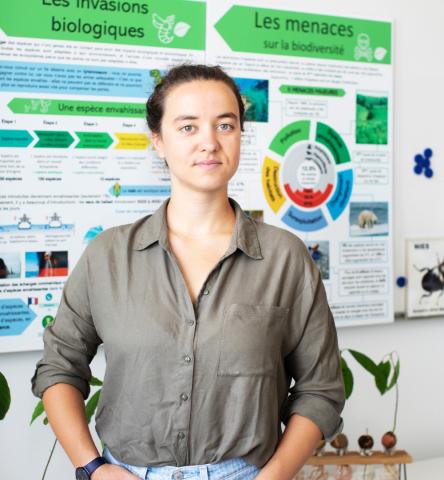
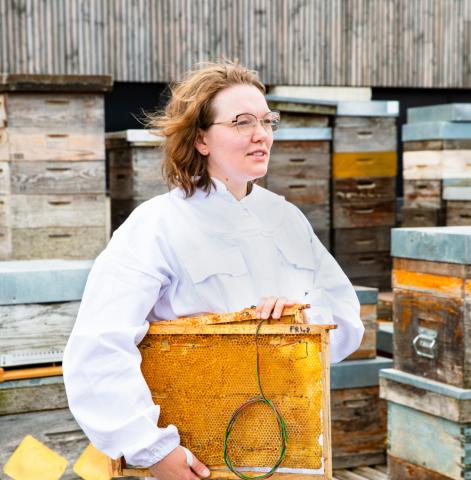
Elise Verrier, is a postdoctoral researcher at the Laboratory for Evolution, Genomes, Behaviour and Ecology (EGCE – Univ. Paris-Saclay, CNRS, IRD). Her work focuses on pollinators, whose progressive disappearance seriously threatens our ecosystems. During her thesis, she contributed to the BeeConnected project, which follows 135 bee colonies in France, Greece and Germany. Elise analyses beehive sensor data (weight and temperatures) to gain a better understanding of their behaviour.
Space, extraterrestrial life, quantum physics
Archrène Dyrek is a PhD candidate at the Paris-Saclay Astrophysics Instrumentation and Modelisation Department (DAP/AIM – Univ. Paris-Saclay, CEA, CNRS, Univ. Paris-Cité) and an engineer. She decided to become an astronomer and she currently studies the atmospheres of exoplanets located thousands of light years away, and in particular a rocky planet that is a cousin to the Earth in terms of size and mass. Her objective is to gain a better understanding of these planets, which evolve outside of our solar system, to uncover a few more of universe’s mysteries.
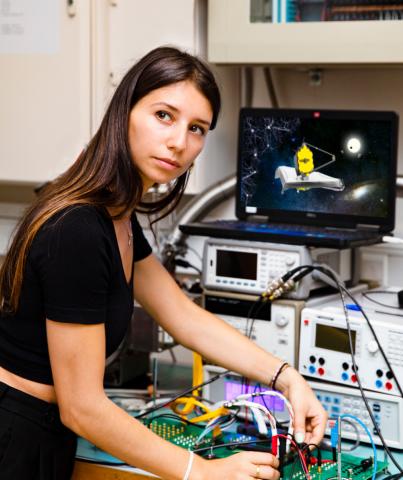
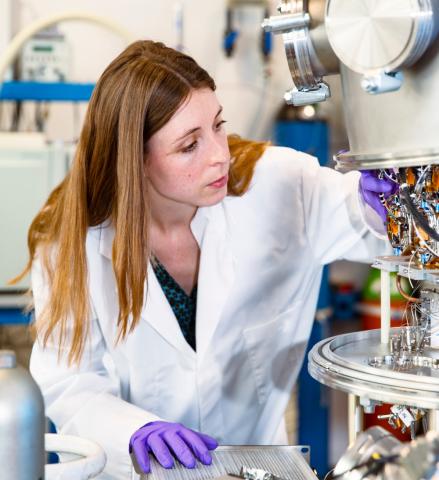
Ophélie Mcintosh is a PhD candidate at the Atmospheres & Space Observations Laboratory (LATMOS – Univ. Paris-Saclay, UVSQ, CNRS, Sorbonne Université). After studying a Bachelor’s degree in Biology, she undertook an Erasmus Mundus Joint Master’s Degree in Tropical Biodiversity and Ecosystems, giving her the chance to study in a different university each semester. From France to Belgium, and Australia to the United States, she became interested in Marine Biology before deciding to specialise in Astrobiology. Driven by her interest in extreme environments, she is currently carrying out her thesis in the LATMOS and the Istituto Naziole di Astrofisica (INAF) on organic matter as part of two space exploration missions.
Genetic mutations, cancer and chronic disease
Manon Cairat is a postdoctoral researcher who has made public health her true calling. After completing a Master’s degree in environmental risks and then a second degree in human nutrition, she carried out her thesis in epidemiology, at the International Agency for Research on Cancer of the World Health Organisation (IARC/WHO), before undertaking a postdoctoral position at the Centre for Epidemiology and Population Health (CESP – Univ. Paris-Saclay, Inserm, UVSQ). Her research focuses on pharmaco-epidemiology and in particular on the potential carcinogenic or anticarcinogenic effects of drugs which are widely used among the population. As a highly committed researcher, she makes cancer prevention, and in particular among young people, a cornerstone of her approach.
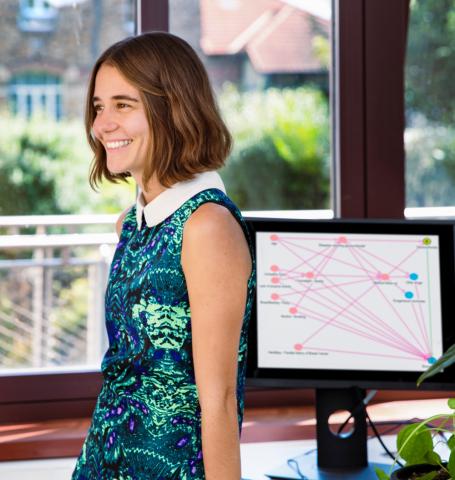
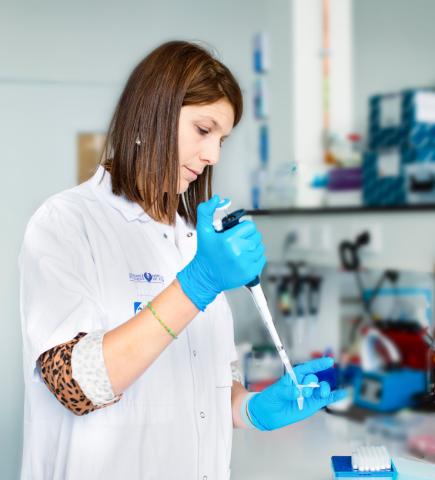
Fanny Chasseloup is a postdoctoral researcher at the Endocrine Physiology and Pathophysiology Laboratory (PHYSENDO – Univ. Paris-Saclay, Inserm). During her medical studies, she wanted to do more than help her patients; she also wanted to understand the deep mechanisms behind their illnesses and decided to pursue endocrinology research in addition to her medical studies. Today, she is head of a university clinic, and a clinical lecturer at the Bicêtre hospital, where she dedicates half of her time to teaching and the study of endocrine diseases.
Mental and children’s health
As a researcher and psychiatrist in cognitive neuroscience, Lucie Berkovitch combines medical practice and research. After completing her thesis at the Cognitive Neuroimaging Laboratory (UNICOG – Univ. Paris-Saclay, Inserm, CEA, CNRS) on understanding the mechanisms of consciousness and its anomalies in schizophrenia using brain imaging, she became Head of Clinic at the Sainte-Anne Hospital in Paris, specialised in the treatment of resistant psychiatric disorders. She is now completing a postdoctoral position at Yale University, where she is currently researching the use of ketamine and psychedelic drugs for therapeutic purposes, before returning soon to Sainte-Anne hospital.
